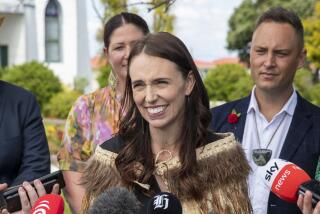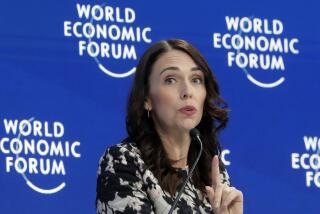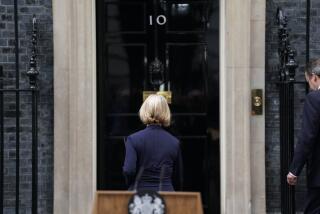Thatcher Bids Queen Farewell, Becomes a Backbencher : Britain: She still represents her district in the House of Commons. For the future, there is talk of a book, lecture tours and the House of Lords.
- Share via
LONDON — The crowd cheered, Margaret Thatcher raised her hand in a familiar wave and then she was gone, out the gates of Buckingham Palace and into history.
Thatcher, prime minister for more than 11 years, had formally resigned and returned her “letters patent” to Queen Elizabeth II and bade the monarch farewell in a 45-minute audience Wednesday morning.
She had already made her final appearance as prime minister at the House of Commons and said goodby to her staff at 10 Downing St., her office and residence, and at Conservative Party headquarters.
Wishing her successor well, she declared in an emotional statement on the steps of 10 Downing: “It has been a tremendous privilege to serve this country as prime minister. Now, it is time for a new chapter to open, and I wish John Major all the luck in the world.”
And without further ceremony, the Thatcher era ended.
Winning three elections in a row, Thatcher had been prime minister longer than any of her predecessors in this century and worked great changes across the whole of British society. But last week, Conservative members of Parliament, fearing that they would lose the next election under her leadership, forced her resignation.
“Her time had come to an end, and she came to recognize it,” Norman Tebbit, one of her closest political advisers, commented Tuesday. “It hurt--there is no denying that it hurt her--but she recognized it and resigned. Now Margaret Thatcher is gone, and we have John Major as the leader of our party.”
Senior Cabinet members were speaking Tuesday of the “natural renewal of the party,” but many British political commentators were describing it as a “palace coup” to remove an increasingly unpopular prime minister.
But Thatcher, although described by columnists as “bitter” over her ouster, held her peace, apparently satisfied that Major, who already had become her choice as a successor, was safely installed as the party’s leader and prime minister.
The gossip columnist Nigel Dempster reported that Thatcher had told her “inner circle” at the beginning of November that she would resign next spring after Major, who had been chancellor of the exchequer, had introduced a new, election-winning budget, complete with tax cuts and lower interest rates.
Thatcher “wished to hand over to Major in the most favorable conditions,” Dempster reported in what appeared to be an attempt to put the best face on what had been a great humiliation for her.
Major, she declared as she left Downing Street, “has the makings of a great prime minister, which I am sure he will become in a very short time.”
“She has behaved impeccably in a most appalling business,” Lord St. John of Fawsley, another Thatcher supporter, said with admiration, and a British Broadcasting Corp. commentator described her as “playing the role of a tragic heroine with absolute aplomb.”
Since her resignation last Thursday, Thatcher has acted with such poise, in fact, that it seemed--except for the brief moment Tuesday morning when she choked back tears outside Downing Street--as if she had wanted all this to happen and had even orchestrated it.
But Thatcher’s tenure had ended so abruptly, so unexpectedly--there is no lame-duck period of transition in British politics--that her plans for the future were far from clear. Although 65, she has no intention of retiring, but what she will do after such a long tenure at the top is uncertain.
“I will be in the House (of Commons) tomorrow,” she told reporters gathered outside her non-official home in the southern London suburb of Dulwich, recalling that she still represents the London constituency of Finchley in Parliament. “We have always worked. It is the only thing we know.”
At her final appearance as prime minister--her 698th “question time” in the House of Commons--she had promised that her sharp debate “will continue from the back benches as they have from the front.”
Former British prime ministers, however, are by political custom entitled to a hereditary earldom, and Thatcher has already been proposed by Burke’s Peerage, the company that keeps track of the British nobility, as the “Countess of Grantham,” a title that would recall her humble origins as a grocer’s daughter in the Lincolnshire village of Grantham.
This would entitle her to sit in the House of Lords, the upper chamber of Parliament, and provide her with a forum in which she can speak out regularly. (Her husband, Denis, would remain “Mr. Thatcher,” according to Burke’s, but her son Mark, a businessman in Texas, would become the Earl of Grantham on her death.)
Thatcher advisers, including Tebbit, said she is likely to defer that honor, if she does accept it, until the next election rather than cause a by-election in which her Finchley seat in Commons might be lost to another party.
For the moment, she has arranged a temporary office at the House of Commons and borrowed staff to answer the more than 30,000 letters she has received, arriving by the sackful, since she resigned. So many flowers were received, more than 1,200 bouquets, that a small fleet of government trucks had to be mobilized to distribute them to London hospitals.
Her next priority, according to aides, will be to take up the scores of invitations for speeches around the world, and she will probably start with a trip to the United States.
And later she will probably write her memoirs, which London literary agents say could fetch as much as $12 million in royalties.
“First, she wants to re-emerge into the world by overcoming the ‘withdrawal symptoms’ that come when you give up power,” her daughter Carol, a free-lance journalist, said over the weekend.
For the longer term, Thatcher is said to be considering the creation of a foundation, much like the one now headed by former President Jimmy Carter, that could serve as a base for her as well as a center to propagate Thatcherism, as her conservative philosophy of less government, more individual initiative and greater self-reliance is now known.
“There is a large world stage for her,” Tebbit commented, “and I hope that she will remain on it for a very long time. . . . There has never been a former prime minister like this one.”
There have also been some playful proposals for Thatcher--president of the European Community, succeeding Jacques Delors, whom she has often criticized, and even governor of a European central bank, whose creation she opposes.
Thatcher’s salary as an ordinary member of Parliament is the equivalent of $52,600, a sharp drop from the $131,700 she received as prime minister, but her 75-year-old husband, a retired businessman, is a multimillionaire.
The whole transition was summed up symbolically as Thatcher, no longer in the prime minister’s black Jaguar but in a lesser bulletproof, bomb-proof limousine, drove out of Buckingham Palace and headed toward her home in Dulwich, a quiet, leafy suburb of stockbrokers, businessmen and professors, rather than back to Downing Street.
Purchased four years ago, the new, $800,000, five-bedroom house has never been lived in. Rather, Thatcher kept it for just such a moment, recalling how former Prime Minister Edward Heath had to hunt for a place to live after he was ousted in a 1974 parliamentary election.
All week long, Denis Thatcher, usually wearing an old blue cardigan, had been loading the family car, an equally old Ford station wagon, with suitcases and boxes and driving them down to Dulwich. On Monday, a big white moving van had taken away the rest of the Thatcher belongings--so many, in fact, that much of the family furniture and personal effects were put into storage.
The house is protected by an iron gate and high walls on three sides but is open on the fourth to a golf course, where Denis Thatcher hopes to spend much of his time. The residence will be guarded by the government’s diplomatic protection service.
Thatcher, still regarded as a target for terrorists, will have police bodyguards, and the government will provide her with an armored limousine. But Denis Thatcher, who had to sell his cherished Rolls-Royce for public relations reasons when his wife became prime minister, plans to buy another.
Carol and Mark Thatcher have been helping with the moving, and Carol took on the task of stocking the Dulwich house with food.
“I offered because I knew she hasn’t been to the supermarket for 12 years,” Carol recalled. “Then she said, ‘Of course I have been to the supermarket--I have opened enough of them.’ She’ll be all right.”
More to Read
Sign up for Essential California
The most important California stories and recommendations in your inbox every morning.
You may occasionally receive promotional content from the Los Angeles Times.













